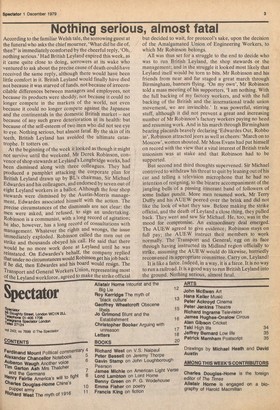Nothing serious, almost fatal
According to the familiar Welsh tale, the sorrowing guest at the funeral who asks the chief mourner, 'What did he die of, then?' is immediately comforted by the cheerful reply, 'Oh, nothing serious.' Had British Leyland expired this week, as it came quite close to doing, sorrowers at its wake who ventured to ask about the precise cause of death could have received the same reply, although there would have been little comfort in it. British Leyland would finally have died not because it was starved of funds, not because of irreconcilable differences between managers and employees, not because its products were shoddy, not because it could no longer `compete in the markets of the world, not even because it could no longer compete against the Japanese and the continentals in the domestic British market — not because of any such grave deterioration in its health: but because of the self-esteem of two men who did not see eye to eye. Nothing serious, but almost fatal. By the skin of its teeth, British Leyland has avoided the ultimate catastrophe. It totters on. At the beginning of the week it looked as thougii it might not survive until the weekend. Mr Derek Robinson, convenor of shop stewards at Leyland's Longbridge works, had been dismissed along with three colleagues. They had produced a pamphlet attacking the corporate plan for British Leyland drawn up by BL's chairman, Sir Michael Edwardes and his colleagues, and endorsed by seven out of eight Leyland workers in a ballot. Although the four shop stewards were dismissed by the Austin-Morris management, Edwardes associated himself with the action. The precise circumstances of the dismissals are not clear: the men were asked, and 'refused, to sign an undertaking. Robinson is a communist, with a long record of agitation; he also, however, has a long record of consultations with management. Whatever the rights and wrongs, the issue immediately exploded. Robinson called the men out on strike and thousands obeyed his call. He said that there Would be no more work done at Leyland until he was reinstated. On Edwardes's behalf, the company replied that under no circumstances would Robinson get his job back: if he did, then Edwardes and his board would resign. The Transport and General Workers Union, representing most of the Leyland workforce, agreed to make the strike official but decided to wait, for protocol's sake, upon the decision•of the Amalgamated Union of Engineering Workers, to which Mr Robinson belongs.
All was thus set for a struggle to the end to decide who was to run British Leyland, the shop stewards or the management; and in the struggle it looked most likely that Leyland itself would be torn to bits. Mr Robinson and his friends from near and far staged a great march through Birmingham, banners flying. 'On my own', Mr Robinson told a mass meeting of his supporters, 'I am nothing. With the full backing of my factory workers, and with the full backing of the British and the international trade union movement, we are invincible.' It was powerful, stirring stuff, although it did not prevent a great and increasing number of Mr Robinson's factory workers paying no heed and resuming work. And in his march through Birmingham bearing placards bravely declaring Edwardes Out, Robbo in', Robinson attracted jeers as well as cheers: 'March on to Moscow', women shouted. Mr Moss Evans had put himself on record with the view that a vital interest of British trade unionism was at stake and that Robinson had to be supported.
But second and third thoughts supervened. Sir Michael contrived to withdraw his threat to quit by leaning out of his car and telling a television microphone that he had no intention of resigning, to the bizarre accompaniment of the jangling bells of a passing itinerant band of followers of some Indian pundit. More men resumed work. Mr Terry Duffy and his AUEW peered over the brink and did not like the look of what they saw. Before making the strike official, and the death of Leyland a close thing, they pulled back. They went and saw Sir Michael. He, too, was in the mood for compromise. An extraordinary deal emerged. The AUEW agreed to give evidence; Robinson stays on full pay; the AUEW instruct their members to work normally. The Transport and General, egg on its face through having instructed its Midland region officially to strike, assuming the AUEW would do likewise, hurriedly reconvened its appropriate committee. Carry on, Leyland!
It is like a farce. Indeed, in a way, it is a farce. It is no way to run a railroad. It is a good way to run British Leyland into the ground. Nothing serious, almost fatal.











































 Previous page
Previous page